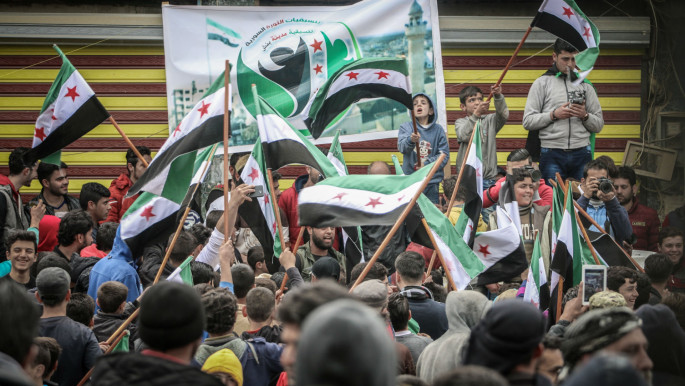
Into its ninth year, the Syrian crisis continues
People embrace and sing in the streets, reminiscent of pre-war Syria, a time before the blood of 400,000 people was shed, and half the country's population were displaced.
From these few images, you would be forgiven for thinking that normality had resumed with the Assad regime back in control of Syria after eight years of conflict, the symbols of pre-war Syria in the birthplace of the revolution.
But the reality is vastly different. Days after the statue was erected and the regime supporters had disappeared, some of the same people who took to the streets in 2011 to ask for their detained young people back, were on the streets again, this time chanting "The country has been destroyed and instead of reconstruction, we place memorials".
For those who've lived through the last eight years of conflict, their war isn't over. Syria's humanitarian and human rights crisis is still happening.
Tens of thousands of people have been forcibly disappeared, tortured and arbitrarily arrested at the hands of the regime - not to mention those who were injured or killed by artillery shelling or chemical weapons.
 |
We will not abandon the victims of a regime which has repeatedly disregarded international law |  |
Many of us will remember seeing the distressing Caesar photographs of mutilated detainees' bodies, with countless families tragically finding about the fate of their loved ones only from these images. Thousands more families are still waiting for news of their loved ones lost into the prison system.
For the displaced Syrians who have returned to regime controlled areas, guarantees that they will not be arrested, tortured or conscripted have been reneged upon.
Across Syria, civilians are facing shortages of essential goods and lack of access to basic services. Two thirds live in extreme poverty. The Syrian regime obstructs humanitarian access across the country and refuses UN requests to deliver aid, preventing help from reaching millions in need.
And in Idlib, three million civilians still live in fear of a reckless military offensive, as well as suffering from Russian and regime bombardment. Even this week, there are reports of desperately concerning airstrikes by the Regime and Russia killing more civilians in Idlib.
 |
|
| In Idlib, Syrians demonstrated on the anniversary of the revolution against the ongoing rule of Assad [Getty] |
Syria is not "back to normal". And the underlying issues which caused the Syrian people to rise up in 2011 have not gone away - they have worsened.
But we will not give up on the people of Syria who need a political solution to end the conflict. We will not abandon the victims of a regime which has repeatedly disregarded international law. And we will not give up on Syrian refugees - and the countries that host them - who should continue to be fully supported until such times as it is safe for them to return to Syria.
The UK wants to see Syria's conflict come to an end as soon as possible. But a lasting peace can only come through a credible, substantive and genuine political process, not a hollow regime 'victory'.
 |
in Idlib, three million civilians still live in fear of a reckless military offensive, as well as suffering from Russian and regime bombardment |  |
And while we will not participate in Assad's lies and help to reconstruct a Syria which remains with a discredited and broken political system, we will continue to maintain our humanitarian support - now £2.81m since 2012 - within the country and around the region, and are ready to support reconstruction in a changed Syria.
We will continue to support accountability mechanisms to gather evidence that will see those who have committed some of the most atrocious human rights violations held to account.
Eight years on from the first protests in Daraa, the hope of that moment has been crushed by the civil war. But one thing has become clear - Syria cannot return to what it was. The Assad regime must change.
Alistair Burt is Minister of State for the Middle East at the Foreign and Commonwealth Office, and Conservative MP for North-East Bedfordshire.
Follow him on Twitter: @AlistairBurtUK





 Follow the Middle East's top stories in English at The New Arab on Google News
Follow the Middle East's top stories in English at The New Arab on Google News


